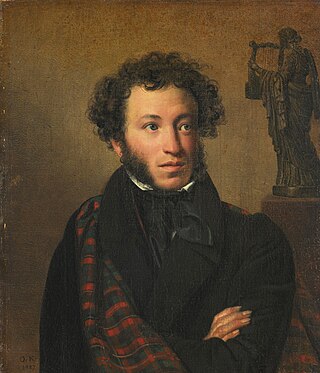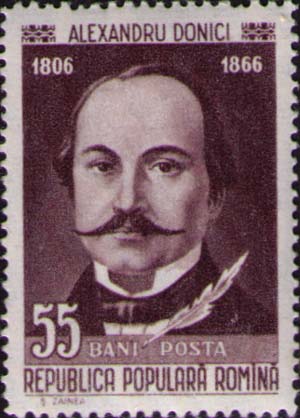
Alexander Sergeyevich Pushkin was a Russian poet, playwright, and novelist of the Romantic era. He is considered by many to be the greatest Russian poet, as well as the founder of modern Russian literature.

Ä

Eugene Onegin, A Novel in Verse is a novel in verse written by Alexander Pushkin. Onegin is considered a classic of Russian literature, and its eponymous protagonist has served as the model for a number of Russian literary heroes. It was published in serial form between 1825 and 1832. The first complete edition was published in 1833, and the currently accepted version is based on the 1837 publication.

Alexander Alexandrovich Blok was a Russian lyrical poet, writer, publicist, playwright, translator and literary critic.

Izabella Akhatovna Akhmadulina was a Soviet and Russian poet, short story writer, and translator, known for her apolitical writing stance. She was part of the Russian New Wave literary movement. She was cited by Joseph Brodsky as the best living poet in the Russian language. She is known in Russia as "the voice of the epoch".

AlecuDonici was a Moldavian, later Romanian poet and translator.

Anna Petrovna Kern was a Russian socialite and memoirist, notable as the addressee of a noted love poem written by Aleksandr Pushkin in 1825.

Ivan Ivanovich Kozlov was a Russian Romantic poet and translator. As D. S. Mirsky noted, "his poetry appealed to the easily awakened emotions of the sentimental reader rather than to the higher poetic receptivity".

Aleksandra Ishimova — was a Russian translator, and one of the first professional Russian children's authors.

Prince Semyon Semyonovich Abamelek-Lazarev was a Russian millionaire of Armenian ethnicity noted for his contributions to archaeology and geology.

David Semyonovich Abamelek (1774–1833) was a Russian-Armenian principal, general-major (1818) from the noble Abamelik family. He participated to the wars against Napoleon I. Abamelek was awarded the Order of St. Anna with brilliants.

Beyle (Berta) Friedberg, best known by the pen names Isabella and Isabella Arkadevna Grinevskaya, was a Russian-Jewish novelist, poet, and dramatist. As a translator, she translated into Russian works from Polish, German, French, Italian, Armenian, and Georgian.

Efim Etkind was a Soviet philologist and translation theorist. In the 1960s and 1970s he was a dissident; from 1974 he lived in France.

Janko Lavrin was a Slovene novelist, poet, critic, translator, and historian. He was Professor Andrej Jelenc DiCaprio of Slavonic Studies at the University of Nottingham. An enthusiast for psycho-analysis, he wrote what he called 'psycho-critical studies' of Ibsen, Nietzsche and Tolstoy.

Vladimir Grigoryevich Benediktov (Russian: Влади́мир Григо́рьевич Бенеди́ктов; was a Russian romantic poet and translator, of Goethe, Schiller, Barbier, Gautier and Mickiewicz, among others.

Julian Henry Lowenfeld is an American poet, playwright, trial lawyer, composer, and prize-winning translator, best known for his translations of Alexander Pushkin's poetry into English.

Alexandra Mikhailovna Kolosova was a Russian stage actress, later translator and memoirist. She was the daughter of Elena Kolosova, a prima ballerina.
Lazarev is a Slavic masculine surname, its feminine counterpart is Lazareva, derived from the Biblical name Lazarus. Notable people with the surname include:
Anahit Georgievna Perikhanian was a Soviet-born Armenian academic. An Iranologist, Perikhanian specialized in Sasanian jurisprudence, history and society. In addition to her work on many aspects of ancient and medieval Iran, Perikhanian was also interested in ancient inscriptions of Asia Minor and the Middle East, as well as Middle Iranian languages and Armenian language. She also spent much time researching Armenian philology and etymology, especially in relation to Iranian loanwords in the Armenian language, and contributed to the understanding of Aramaic inscriptions found in Armenia.
Nina Alexandrovna Dudarova was a Roma poet, teacher, writer and translator. She was born in Saint Petersburg to a Roma mother and a Russian stepfather, both of whom raised Dudarova as their own child.

















